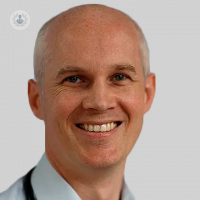All about breathlessness
Written in association with:Breathlessness is the sensation of not getting enough air, even when breathing deeply or rapidly. There is a wide range of conditions that may cause someone to struggle with breathlessness, including psychological, cardiac, or pulmonary disorders. In this article, Dr Timothy Chapman, a consultant respiratory physician, shares his expertise all about breathlessness.

What is breathlessness?
Breathlessness, also known as dyspnoea, is not a medical condition in and of itself; rather, it is a symptom that can be a part of many conditions.
Breathlessness is characterised by wheezing or shallow breathing. It may be accompanied by other symptoms like fatigue, a rapidly beating heart and chest pain, coughing, and dizziness. People experiencing breathlessness may also panic at the idea that they’re not breathing properly, which can worsen the sensation.
In some cases, when breathlessness is triggered and lasts for a prolonged period, it can lead to choking, swelling limbs, blueing fingers and toes, and fainting – when this happens, medical attention should be sought immediately.
What are the causes of breathlessness?
Breathlessness can be sorted into two types: acute and chronic.
Acute breathlessness refers to episodes that suddenly occur, lasting between a few hours to a few days, whereas chronic breathlessness refers to episodes that last longer, such as for a week and beyond.
Causes of acute breathlessness can be allergic reactions, pneumonia (or other lung infections), anxiety and panic attacks, pulmonary embolism, foreign objects in the throat or airways, or a history of smoking.
Causes of chronic breathlessness can be chronic obstructive pulmonary disease (COPD), lung cancer, heart diseases, or bodily stress from obesity.
Asthma can cause both chronic and acute breathlessness.
Chronic breathlessness tends to be indicative of more serious health conditions, but an acute episode may be more urgent when it occurs.
Regardless of the cause, breathlessness is an issue of concern, as should someone struggle to respire properly, the blood will not get infused with the oxygen it needs to power organ and muscle function. Too long without sufficient oxygen, and the body can begin to shut down.
How can breathlessness be treated?
To treat breathlessness, the underlying cause must be treated primarily, which can be diagnosed through a variety of examinations and tests such as blood tests, bronchoscopies, chest X-rays and CT scans, cardiopulmonary exercise tests (CPET), or echocardiography, among others.
Inhaled medications called bronchodilators, which relax the airways to allow more air intake, are typically prescribed for asthma and COPD. Patients may also require anti-anxiety medication for panic symptoms.
Patients can manage breathlessness with lifestyle adjustments, if the underlying cause is not a serious malady that needs intensive treatment. This can be done by:
- Exercising more, to strengthen the muscles, lungs, and heart whilst increasing the anaerobic threshold, which is the highest amount of physical activity a person can sustain for a prolonged period of time.
- Meditation and stress relief, which will teach breathing exercises to control anxiety and also alleviate breathlessness from underlying conditions.
- Stop smoking tobacco, which will not only help with breathlessness, but with other health conditions.
If you are experiencing chronic or acute breathlessness, consult with Dr Chapman via his Top Doctors profile today.


